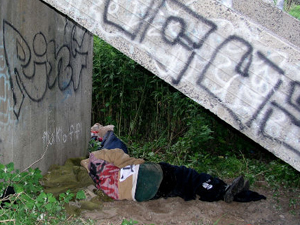On Charity
 Summer is over and fall is here. One of the rites of fall: the county fair. I’ve always been ambivalent about the fair. I enjoy it, but I’m always struck by (i) how expensive it is, and (ii) how many people who apparently can’t afford basic things (like shampoo and dental care) are out there.
Summer is over and fall is here. One of the rites of fall: the county fair. I’ve always been ambivalent about the fair. I enjoy it, but I’m always struck by (i) how expensive it is, and (ii) how many people who apparently can’t afford basic things (like shampoo and dental care) are out there.
Dorothy Day said that the poor always smell and are always ungrateful. Those traits are things that help make poverty work hard. It makes poverty work a lot harder for me. Nothing makes me bristle more than volunteering to raise money for people who expect me to volunteer to raise money for them.
In fact, I have a devilish Ayn Rand-ish streak in me, one that says all charity work for the dispossessed is bad: a fraud that is filled with bad consequences for society as a whole and an injustice.
First, the fraud: Many of the dispossessed game the charitable system. If they spent half as much time working legitimately than they do trying to get free hand-outs, they’d make enough money to subsist without charity.
Second, the bad consequences: These are legion. Here are a few: (1) By enabling the dispossessed to game the charitable system instead of working productively, we hamper the creation of wealth. (2) By allowing people to demand goods instead of working for them, we weaken the social fabric. A person can get his free clothes, give the volunteers the middle finger, then walk away. . . then come back again later. (3) We contribute to the permanent underclass that big government programs have already enlarged beyond belief. (4) The inner cities stay suppressed (for the reasons set forth in (1) and (2)).
Third, it’s an injustice. The virtue of justice is “the constant and permanent determination to give everyone his or her rightful due.” John Hardon, Modern Catholic Dictionary. How is it “just” for me to take resources away from my family to give them to insufferable (tattooed and sassy, in my experience) individuals who won’t work (remember: that’s the crux of the problem I’m addressing here; charity for people Dorothy Day described . . . I’m not talking about crippled children and disabled veterans).
It’s interesting that Fr. Hardon’s Modern Catholic Dictionary compares “justice” to “charity,” more or less contrasting them. I’ll admit it: I’ve never understood the phrase “social justice.” To the extent it simply means the creation and strengthening of government institutions to help the poor, it’s neither social (the State kills society; when government takes over, individuals cease to care) nor justice (it takes private property from some to give to others).
All this, of course, puts me outside Church teachings when it comes to charity. Try as I might, I can’t agree with the Church’s teaching that we need big government programs (though this is not a Church teaching, it can’t be denied that it has informed much of our bishops’ thinking for the past fifty years, which is why the health mandate is so humorous: the bishops as an institution promoted the growth of this beast, and now they’re lamenting that the beast is too powerful). I can’t agree with the Church’s teaching that charity work helps the poor; in fact, I think it does the opposite. I can’t agree with the Church’s teaching that charity work helps society.
So where does that leave me?
I’m afraid it puts me in intellectual limbo. The Church’s teaching is binding in matters of faith and morals. The injunction to do charity work is, in my opinion, as undeniable as the Church’s teaching on, say, artificial contraception. And, although the teaching on charity work has more issues and angles than contraception, it’s clearly binding. Logic prohibits me from ignoring it, even though logic outside Church teaching tells me charitable work is at best a waste of time and, at worst, harmful.
At such junctures, a Catholic must give assent of the mind, then act in accordance with Church teaching. I can keep questioning the pondering, but I can’t actively militate against the teaching.
That’s all I can write on this topic today. I have to go to the county fair and work all day in the Kiwanis Food Building.
Raising money for charity.

